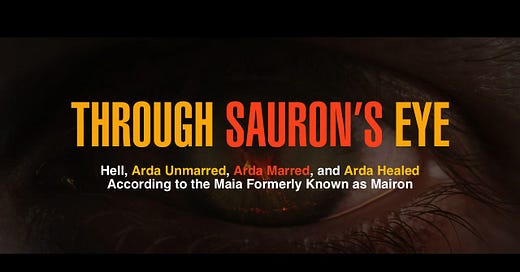Through Sauron’s Eye [Conference Presentation]
Hell, Arda Unmarred, Arda Marred, and Arda Healed According to the Maia Formerly Known as Mairon
This paper has been presented at:
Aug 6th, 2023 | MythSoc OMS (View a recording)
Abstract
From the beginning of Tolkien scholarship Mordor has been analyzed in light of its Hellish iconography; from the perspective of the narrative voice, what constitutes “Hell” in Middle-earth may seem clear. But what is Hell to Mordor’s chief inhabitant? What is Hell in Sauron’s Eye?
The Rings of Power has brought Sauron into the spotlight by interpreting him not as depersonalized evil but as a character in his own right. Actor Charlie Vickers has shared how he developed this character for the screen, adapting characteristics taken directly from Tolkien’s own writings: Sauron’s love of order and his desire to “heal” Middle-earth—a goal with its implicit suggestion of utopian vision. Is such a goal even achievable within the theological and metaphysical constraints of Middle-earth?
Drawing on Tolkien’s writings about Sauron from the 1950s and the work of Jonathan McIntosh, John Garth, and Verlyn Flieger (among others), I intend to argue that Sauron’s goal strikes at the nature of Arda itself; to Sauron, Hell is Arda Marred, and his struggle to order it is ultimately his own struggle with the Problem of Evil—the very force he, in a feedback loop, comes to represent.
Publication
Forthcoming!
Bibliography
Andreeva, Nellie, Behind ‘Rings Of Power’s Sauron Reveal As Actor Speaks About Secret Identity & Clues Fans May Have Missed, article, Deadline, 14 October 2022, https://deadline.com/2022/10/lotr-rings-of-powers-sauron-reveal-charlie-vickers-halbrand-clues-spoilers-season-1-finale-1235145363/ [accessed 9 August 2023]
Bossert, A. R., “‘Surely You Don't Disbelieve’: Tolkien and Pius X: Anti-Modernism in Middle-earth,” Mythlore 25.1 (2006), article 5. https://dc.swosu.edu/mythlore/vol25/iss1/5
Bourquein, Cameron, “The Nameless Enemy: How Do You Solve a Problem Like ‘Mairon’?,” virtual conference paper, Oxonmoot 51, 31 August 2024.
— “Wizard, Demon, Cat; Reformer, Satanist, Bureaucrat: a Diachronic Analysis of Three Modes of Sauron in the Legendarium in Light of The Book of Lost Tales,” Journal of Tolkien Research, 19.2 (2024), article 7. https://scholar.valpo.edu/journaloftolkienresearch/vol19/iss2/7
Boyd, Craig, “Denethor’s Descent into Hell,” virtual conference paper, MythSoc OMS 2, 5 August 2023. https://dc.swosu.edu/oms/oms2/schedule/7/
Campbell, Liam, “Nature,” A Companion to J. R. R. Tolkien, first edition, edited by Stuart D. Lee, (Hoboken: Wiley-Blackwell, 2020).
Collins, Robert A. “‘Ainulindale’: Tolkien’s Commitment to an Aesthetic Ontology,” Journal of the Fantastic in the Arts, vol. 11, no. 3 (43), 2000, pp. 257–65. <http://www.jstor.org/stable/43308458>
Fauskanger, Helge Kåre, A Name for the Dark Lord, webpage, Ardalambion.net, n.d., <https://ardalambion.net/sauronname.htm> [accessed 10 December 2022].
Flieger, Verlyn, Interrupted Music: The Making of Tolkien’s Mythology, (Kent: Kent State University Press, 2005).
— “Naming the Unnamable: The Neoplatonic ‘One’ in Tolkien’s Silmarillion,” Diakonia: Studies in Honor of Robert T. Meyer, edited by T. Halton and J.P. Willimer (Washington, DC: Catholic University of America Press, pp. 127–32. 1986).
— Splintered Light: Logos and Language in Tolkien’s World, Revised Edition, (Kent: Kent State University Press, 2002).
Freeman, Austin M., Tolkien Dogmatics: Theology through Mythology with the Maker of Middle-earth, (Bellingham: Lexham Press, 2022). Kindle edition
Garth, John. “Ilu’s Music: The Creation of Tolkien’s Creation Myth.” Sub-Creating Arda: World-Building in J.R.R. Tolkien’s Work, Its Precursors and Its Legacies, edited by Dimitra Fimi and Thomas M. Honegger, Walking Tree, 2019, pp. 117–51.
Gervel, Quinn A. J., “Tolkien's Mythic Meaning: The Reader's Ontological Encounters in The Lord of the Rings,” Phd Thesis, School of Arts, Languages and Cultures, 1 August 2020.
Hood, Gwenyth E., “Sauron as Gorgon and Basilisk,” VII: An Anglo-American Literary Review, 8 (1987b), 59–71 https://mds.marshall.edu/english_faculty/30/
Huttar, Charles A.. “Hell and the City: Tolkien and the Traditions of Western Literature.” A Tolkien Compass: Including J.R.R. Tolkien's Guide to the Names in The Lord of the Rings, edited by Jared Lobdell, Open Court, 1975, pp. 117–42.
Kaufmann, U. Milo, “Aspects of the Paradasical in Tolkien’s Work,” A Tolkien Compass: Including J.R.R. Tolkien's Guide to the Names in The Lord of the Rings, edited by Jared Lobdell, Open Court, 1975, pp. 143–52.
McIntosh, Jonathan S., The Flame Imperishable: Tolkien, St. Thomas, and the Metaphysics of Faerie, (New York: Angelico Press, 2018). Kindle edition
OED, “Coordination, n.” n.d., <https://www.oed.com/dictionary/co-ordination_n> [accessed 1 August 2023]
— “Order, n.” n.d., <https://www.oed.com/dictionary/order_n> [accessed 1 August 2023]
— “Order, v.” n.d., <https://www.oed.com/dictionary/order_v> [accessed 1 August 2023]
— “Reform, v” n.d., <https://www.oed.com/dictionary/reform_v1> [accessed 1 August 2023]
The Rings of Power, created by Patrick McKay and JD Payne, season 1, (Amazon Studios, 2022).
Scoville, Chester N., “Pastoralia and Perfectibility in William Morris and J.R.R. Tolkien,” Tolkien's Modern Middle Ages, edited by Jane Chance and Alfred K. Siewers, (London: Palgrave Macmillan, 2005).
Shippey, Tom, J. R. R. Tolkien: Author of the Century, (Boston: Houghton Mifflin Company, 2001).
Tolkien, J.R.R., The Letters of J. R. R. Tolkien, edited by Humphrey Carpenter, (New York: William Morrow, 2023). Kindle edition
— The Lord of the Rings: One Volume Edition with the Appendices, (New York: William Morrow, 2023). Kindle edition
— The Lost Road, edited by Christopher Tolkien, (New York: William Morrow, 2021). Kindle edition
— Morgoth’s Ring, edited by Christopher Tolkien, (New York: William Morrow, 2023). Kindle edition
— The Nature of Middle-earth, edited by Carl Hostetter, (New York: William Morrow, 2023). Kindle edition
— Parma Eldalamberon vol. 17, edited by Christopher Gilson, (The Elvish Linguistic Fellowship, 2007).
— The Return of the Shadow, edited by Christopher Tolkien, (New York: William Morrow, 2021). Kindle edition
— The Shaping of Middle-earth, edited by Christopher Tolkien, (New York: William Morrow, 2021). Kindle edition
— The Silmarillion, edited by Christopher Tolkien, (New York: William Morrow, 2023). Kindle edition
— Tolkien on Fairy-Stories, edited by Verlyn Flieger and Douglas A. Anderson, (London: HarperCollins, 2014).
— Unfinished Tales of Numenor and Middle-earth, edited by Christopher Tolkien, (New York: William Morrow, 2012). Kindle edition.
Walsh, John, “Hell,” J. R. R. Tolkien Encyclopedia: Scholarship and Critical Assessment, edited by Michael D. C. Drout, (New York: Routledge, 2007).
Whittingham, Elizabeth A. The Evolution of Tolkien’s Mythology: A Study of the History of Middle-Earth, (Jefferson: McFarland, 2007).




